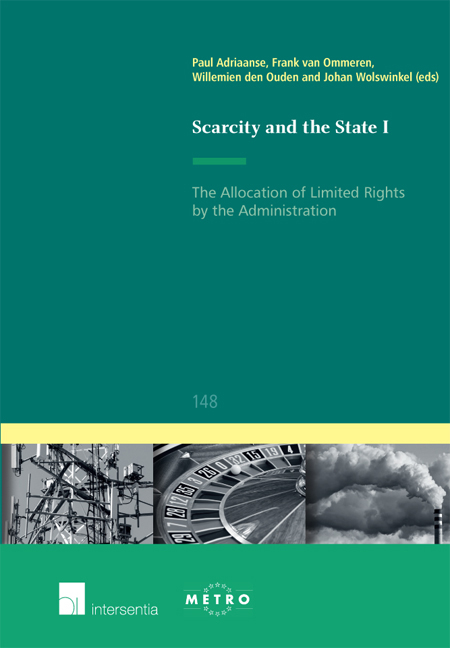Book contents
- Frontmatter
- Foreword
- Editors’ Preface
- Contents
- Part I General Perspectives
- Part II Eu Law Perspectives
- Part III Comparative Law Perspectives
- Chapter 12 ‘Let It Be’? The Regulation and Allocation of Gambling Licences at the EU and Member State Level
- Chapter 13 The Allocation of Radio Frequencies; Overview of Spectrum Policy and Regulation in Europe
- Chapter 14 The Allocation of Emission Rights
- List of Contributors
- Ius Commune Europaeum
Chapter 12 - ‘Let It Be’? The Regulation and Allocation of Gambling Licences at the EU and Member State Level
from Part III - Comparative Law Perspectives
Published online by Cambridge University Press: 22 September 2018
- Frontmatter
- Foreword
- Editors’ Preface
- Contents
- Part I General Perspectives
- Part II Eu Law Perspectives
- Part III Comparative Law Perspectives
- Chapter 12 ‘Let It Be’? The Regulation and Allocation of Gambling Licences at the EU and Member State Level
- Chapter 13 The Allocation of Radio Frequencies; Overview of Spectrum Policy and Regulation in Europe
- Chapter 14 The Allocation of Emission Rights
- List of Contributors
- Ius Commune Europaeum
Summary
Introduction: The Trilemma of Gambling Regulation
For those looking for an on-line poker room right now, gambling opportunities will hardly appear scarce. For those looking for licences to legally offer such games of chance, scarcity is usually very real. Apparent incongruities like these lie at the heart of the legal dilemmas concerning gambling services in the EU and many individual Member States.
On the one hand, gambling poses serious risks relating to addiction, crime and fraud. Member States are rightly trying to protect their citizens from these risks. One of the main ways Member States try to do so is by limiting and regulating games of chance. Be it via a blanket prohibition, a monopoly or restrictive licensing, many Member States aim to create an artificial scarcity in games of chance. This scarcity can concern the volume of games of chance, such as, in particular, the amount of casino's, gaming machines or lottery draws allowed; it may also concern the nature of the games of chance offered, for example in terms of attractiveness, game dynamics or incentives offered.
On the other hand, games of chance bring in serious revenue for Member States and all kinds of good causes. A certain temptation to expand gambling may therefore exist. The desire of humankind to gamble seems almost unstoppable anyway. Certainly with the advent of the internet, entirely preventing people from betting seems to behave become ‘virtually’ impossible. So why not regulate what you cannot prevent, and make some money along the way, especially as revenue might otherwise ‘leak’ to illegal suppliers?
National regulation of games of chance typically tries to navigate this trilemma of protection, revenue and the reality of illegal supply. How to balance protection versus revenue? How to make the legal supply, if any, attractive enough to fend of illegal competition, but not so attractive so as to cause the very same harm that justifies prohibiting the unregulated and illegal supply? And how to find the right balance in the midst of an on-line revolution that may leave national borders meaningless?
In navigating this trilemma, states have to respect EU law, including the rules on equal treatment, free movement, fair competition and state aid. And these rules add an interesting twist.
- Type
- Chapter
- Information
- Scarcity and the StateThe Allocation of Limited Rights by the Administration, pp. 299 - 322Publisher: IntersentiaPrint publication year: 2016



